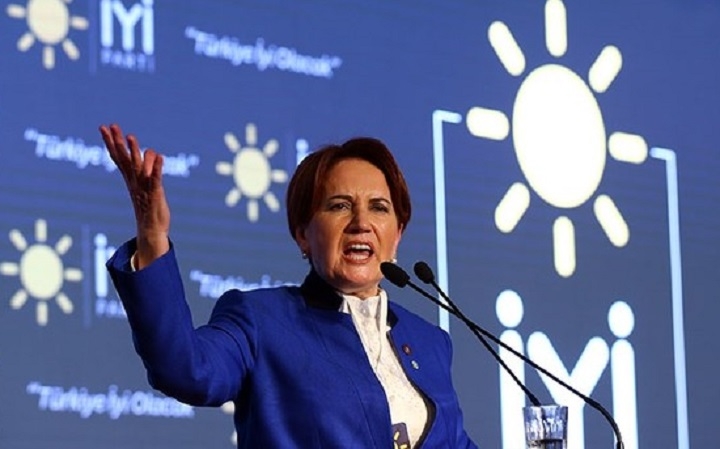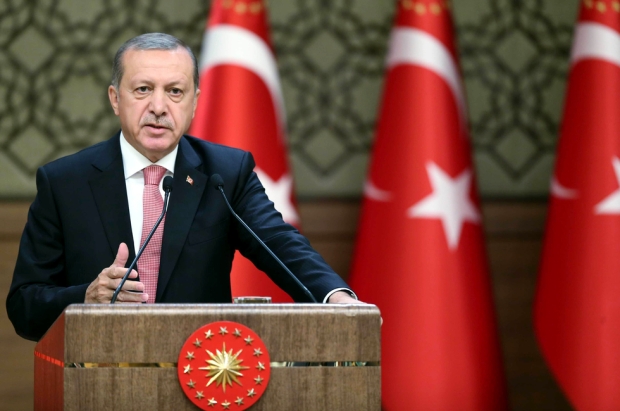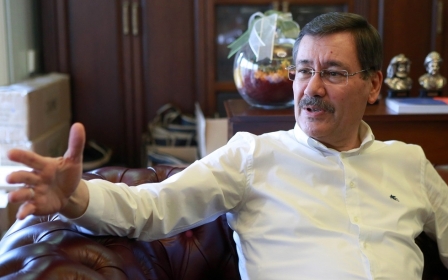ANALYSIS: Sun rises on Good Party, as it heads into Turkish political storm

ISTANBUL, Turkey – It calls itself the Good Party, its logo is a bright yellow sun and it is led by a charismatic leader promising "Turkey will be fine". But analysts say Meral Aksener, a stanch opponent of the ruling AKP party, faces a daunting task of making an impact with her centre-right project in the country's turbulent political climate.
Aksener on Wednesday unveiled her "Iyi Party" in the capital Ankara, with a launch pamphlet stating: "We are embarking on this path for a good Turkey... We are aware that we have embarked on this path during a tough time and under difficult circumstances. We trust and believe in our nation."
In her maiden speech, Aksener targeted the current polarisation in the country and thanked past Turkish leaders from across the political spectrum – from Mustafa Kemal Ataturk to the conservative Adnan Menderes, and from the Islamist Necmettin Erbakan to the ardent secularist Bulent Ecevit.
Aksener also said the cornerstones of any state are law, justice and meritocracy - and that those who were afraid of freedom were cowards and their rule would end.
The formation of the new Turkish centre-right party has been two years in the making. It began when Devlet Bahceli, the leader of the right-wing Nationalist Movement Party (MHP), left Aksener off the party's MP electoral list in 2015.
Aksener was a fierce opponent of the budding alliance between the MHP and Turkish President Recep Tayyip Erdogan's ruling AKP. She was subsequently dismissed from the MHP.
The big question now, analysts say, is what the party's goals are and whether it can succeed in the current political climate, where all opposition is increasingly stifled.
Kemal Can, a specialist on the Turkish right and author of two books on the MHP, told Middle East Eye that Aksener's party could prove to be a major success but only if it aimed for the very top.
"Meral Aksener's party has to aim to become the ruling party. Anything else and it will become inconsequential. What is the point of having a party on the right that just manages to squeeze into parliament and sits in opposition?" he said.
The country's current political climate gives the new party a 50-50 chance of success, according to Can.
"Politically, the voter base on the Turkish right is very undecided now so in that sense it is an opportunity. On the other hand, it is not an ideal climate to be a political force at the moment," said Can.
Who votes for Good?
While campaigning for the "no" camp in the run-in to April's referendum on strengthened presidential powers, Aksener already proved her ability to draw a large amount of support away from the MHP.
She is also likely to draw some support away from the Republican People's Party (CHP) by getting a few significant names from that party to defect.
But her ability to make a dent in the AKP voter base will ultimately prove vital.
"The voter base on the right consists of those who vote for the MHP and AKP. Aksener should easily take away more than half of the MHP's vote. Whether she can eat into the AKP's right-leaning voter base will determine if she can carry her party through an election," said Can.
Aksener's party has to aim to become the ruling party. Anything else and it will become inconsequential
- Kemal Can, Turkish political author
At the moment there are no real cracks in the AKP voter base to suggest the possibility of a split, said Can. But party insiders have privately suggested that internal discontent, in regard to how the party is shaping up and the direction it is headed, is at an all-time high.
Erdogan has completely cast aside major party heavyweights who he deemed strong enough to challenge him. Since officially retaking the chairmanship of the AKP following the April referendum, he has expedited his purge of party members deemed not loyal enough to him.
Party insiders have also suggested that fear of reprisal is keeping dissidents silent for now but many defections are likely if they see a strong and viable alternative.
Challenges
But first Aksener's party will have to overcome opposition from the MHP and AKP, both legal and otherwise.
When she was campaigning during the referendum, venues she spoke at were sometimes physically attacked by mobs. At other times, power was cut off or venue management teams just cancelled her bookings without notice.
The booking for the original venue to unveil her new party on Wednesday was also cancelled. The formation of the party was announced at a cultural centre run by a CHP municipality. The centre named in honour of renowned Turkish poet Nazim Hikmet, a staunch communist and leftist, is unlikely to have been the first choice for a centre-right party.
The choice of venue could yet prove apt though given the party's declared intention of uniting people from various political shades under its roof.
Ali Turksen, a national hero for leading a team of commandos which replaced a Greek flag on the Aegean islet of Kardak with a Turkish one in 1996, had no hesitation about entering politics under Aksener's banner.
"I am convinced that our new party under Meral Aksener can bring all the vast and diverse segments of Turkey together. She can lead a party that takes us all towards a better future," he told MEE.
On how the party would deal with political obstacles, Turksen said: "I sincerely believe we have the backing and blessing of a large section of the public. That backing and the knowledge of it will help us deal with it all."
Aksener's hand in countering allegations from sources close to the MHP and AKP that she has links to Gulenists has also been strengthened by Turksen's joining the party.
Gulenists are followers of the US-based Turkish Muslim preacher Fethullah Gulen, whom authorities hold responsible for last July's failed coup attempt.
Turksen was sentenced to 16 years in prison in 2011 by what is now believed to be Gulenist prosecutors and judges for allegedly plotting to overthrow the government.
In 2014, the case against him was dismissed as a fabrication, and he was released after serving three-and-a-half years behind bars.
Cooperation critical
Aksener's party will also be faced with the choice of how it approaches the 2019 presidential elections, which will bestow the winner with vast powers and few checks.
The AKP's continued political success for the last 15 years could mean it becomes necessary for parties from both the left and right to cooperate.
Aksener's strong ties to the right, alongside many of her core team, raises the question of her willingness and flexibility of working with the left.
She was successful in aligning and in effect creating an umbrella comprising various sides of the No bloc during the referendum. The No bloc's campaign, which despite narrowly losing out, was largely deemed efficient and a success.
"Cooperation during the referendum was a success but then Aksener didn't have to stand as a candidate," said Can.
"Presidential elections and other elections will be different. Aksener will now have to balance a situation where she and her party need to have an active and visible political platform while seeking cooperation with others."
Erdogan is also not likely to silently watch as a challenger to his rule emerges. He has so far refused to publicly comment on a party that "doesn't exist".
But some observers have indicated that the sudden appearance of former prime minister Tansu Ciller - under whose government Aksener served as interior minister – at public functions alongside Erdogan is a sign that he has already set his counter-strategy in motion.
And he is a formidable opponent.
New MEE newsletter: Jerusalem Dispatch
Sign up to get the latest insights and analysis on Israel-Palestine, alongside Turkey Unpacked and other MEE newsletters
Middle East Eye delivers independent and unrivalled coverage and analysis of the Middle East, North Africa and beyond. To learn more about republishing this content and the associated fees, please fill out this form. More about MEE can be found here.





